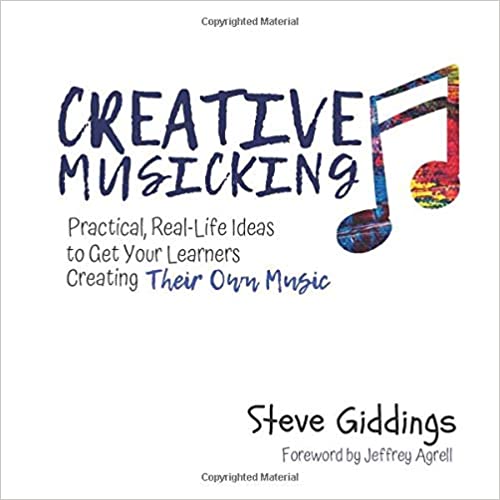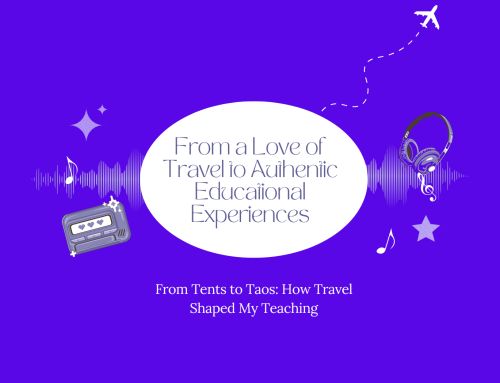I am passionate about music education, specifically Popular Music Education, Creativity, and Informal Learning. So passionate, in fact, that I have written two books under my own publishing company, Steve’s Music Room Publishing, and have been commissioned for a third through the Oxford University Press–yes, that Oxford University Press. I had always dreamed of someday writing a book about something. When I was a kid, I would write video game manuals and different things for fun (I know, weird). I am sure many other people have this dream in some form or another, whether they are serious about it or just daydreaming, but I never once thought I would be where I am.
My first book, Rock Coach: A Practical Guide for Teaching Rock Bands in Schools, was inspired by my love of helping other teachers. It gives the reader all the practical and philosophical knowledge to be successful with a rock band or popular music ensemble in their schools. It is aimed at the classically trained music teacher or beginning rock coach. It all began with my love for helping other teachers. In the summer of 2009, I started a website called StevesMusicRoom.com. It began as a place where beginning and veteran teachers could get free lesson plans that included a forum (that got almost no traffic aside from a few of my music teacher friends) and a blog that looked like it belonged in the late 90s. During this time, I was writing articles for the Canadian Music Educator Journal on a yearly basis. By the Summer of 2016, not only did I have enough content from the blog and my CMEJ articles, I had amassed a library of songs, tried-and-true approaches, and a master’s degree to back it all up. It was time. I decided to publish a book under CreateSpace (which is now Kindle Direct Publishing) and began researching how it all worked. I learned a lot about publishing, writing, and how much work it is to pull off something like this. The biggest lesson I learned was that the easiest part is writing it. You can read about my Self-publishing adventures more in-depth on this blog post.
Table of Contents
The Precursor
When I was having serious thoughts about writing it, I kept talking myself down. My wife was pregnant with our first child at the time, and we often had serious conversations about it. We usually concluded that I should wait for more education or wait until I had a job that fit that type of thing (such as a university prof). In August of that year, I realized that it would never come if I waited until the right time. The right time was now. I began devoting much of my time to writing and then kept writing after our son was born in October. I would often get up early with him on Saturdays and write while he slept. I would devote evenings and nap times to writing while still spending ample time with my new family.
During this time, I began researching the legalities of writing and publishing books and using transcribed music, pictures, and parts of other books in my work. I also spent a good chunk of time on how to format, what fonts to use, and cover design. This part of the process was time-consuming. The first draft of that book was completed in six months, and then came the other stuff. I’m not telling you this to discourage you; quite the opposite. Once you get the words on the page, myself or folks at F-flat books can help! And I’m serious when I tell you, the easiest part is writing it.
My second book, Creative Musicking: Practical, Real-life Ideas to Get Your Learners Creating Their Own Music, published in January of 2020, is the best of my first book combined with ways to implement creativity into music lessons in authentic and meaningful ways. The overall philosophy is that learning should begin with creating and that improvisation and composition are often thought about as much more complex and difficult than they actually are. Since publishing Rock Coach, I had accumulated more content on my blog and had landed a regular column in the Canadian Music Educators’ Journal based on the work from Rock Coach. Putting the first draft together for Creative Musicking took two weeks due to all the content I had produced to that point, but the publishing process took almost a year to the date due to several factors.
The Aftermath
In February 2020, about a month after Creative Musicking was released, I was contacted by Oxford University Press to write a book for them because someone on their team had read Creative Musicking and loved it! This forthcoming book will be creativity-themed but with a technology focus. One of the major differences between writing a book under my own company name and OUP is that I had to write a short book about what the book would be about. After that, this proposal had to be reviewed by peer reviewers; then, I had to respond to the reviews saying why I agreed or disagreed with their points of view. The best part about the process that I’ve noticed so far is that I have an editor whose job is to check my work and give suggestions!
A few tips for new writers
- Just write. Edit later.
- You are finished when you’re finished. You will know when it’s done.
- Keep notes. I have notes on my phone, my desk, and on my computer.
- Write often. The more you do anything, the better you become at it.
- Start a blog. It is a great way to begin writing seriously. It’s how I got more and more into writing. It creates content for a future book. I’ve even heard of writers releasing a chapter at a time in the form of blog posts.
- You will need someone to look over your work on occasion. If it is something bigger (like a book), you most definitely need someone.
- Any time you can commit to writing is enough.
Just Do It!
Since I’ve published Rock Coach and Creative Musicking, I have been asked to present at international conferences, host online events, and help music teachers all over the world. It is what I envisioned myself doing since I was asked to present at a small PEI conference in 2013. I mean, it doesn’t just happen, there is a lot of work involved in landing gigs like that too, but at least now I can back it all up. I would love to connect with you, and I am more than willing to help you reach your goals concerning self-publishing, popular music, creativity, or informal learning.
You are probably wondering: Steve! Do I really need to know this? And well, I do understand that this might sound like a brag (and it partly is); it is also to help inspire would-be music teacher-authors like you to write that book. There is never a good time, nor is there ever the right time. As I mentioned before: the easiest part is writing it. It’s in your head; just go write!





Leave A Comment